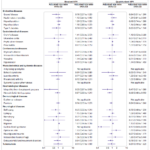BMJ: Research data show that HPV vaccine is equally safe for Asians
- Normal Liver Cells Found to Promote Cancer Metastasis to the Liver
- Nearly 80% Complete Remission: Breakthrough in ADC Anti-Tumor Treatment
- Vaccination Against Common Diseases May Prevent Dementia!
- New Alzheimer’s Disease (AD) Diagnosis and Staging Criteria
- Breakthrough in Alzheimer’s Disease: New Nasal Spray Halts Cognitive Decline by Targeting Toxic Protein
- Can the Tap Water at the Paris Olympics be Drunk Directly?
BMJ: Research data of 440K people show that HPV vaccine is equally safe for Asians
BMJ: Research data of 440K people show that HPV vaccine is equally safe for Asians. Source | Metz Medicine Cervical cancer is one of the most common cancers in women worldwide. In 2012 alone, there were 630,000 new cases of human papillomavirus (HPV)-related cancer, of which 530,000 (84%) were diagnosed as cervical cancer.
Cervical cancer is one of the most common cancers in women worldwide. In 2012 alone, there were 630,000 new cases of human papillomavirus (HPV)-related cancer, of which 530,000 (84%) were diagnosed as cervical cancer. Approximately 266,000 women with cervical cancer died from cancer, accounting for 8% of all cancer-related deaths among women worldwide. According to the latest data from the International Agency for Research on Cancer (IARC) of the World Health Organization, in 2020, it is estimated that more than 600,000 women worldwide will be newly diagnosed with cervical cancer, and more than 340,000 women will be killed by cervical cancer.
The current World Health Organization (WHO) recommendation for HPV immunization is to give priority to girls 9-14 years old who have not had sex. As of 2019, 124 countries have included HPV vaccination policies into their national immunization plans. Since June 2016, the Korean Agency for Disease Control and Prevention has also launched a two-dose plan for bivalent or quadrivalent HPV vaccine for adolescent girls aged 12-13. In the first year of implementation of the plan, the coverage rate of the first dose of HPV vaccine for school-age women was 61.5%, and by 2018, the coverage rate had increased to 87.2%.
Although the HPV vaccine is widely used worldwide, there have been concerns about the safety of HPV vaccination, and it has been confirmed that concerns about serious adverse events related to the vaccine have weakened public confidence in immunization.
In October 2020, Lei Jiayao and others from Karolinska Institutet in Sweden published a research paper titled “HPV Vaccination and the Risk of Invasive Cervical Cancer” in the New England Journal of Medicine (NEJM).
This study showed that among girls and adult women aged 10-30 in Sweden, the incidence of invasive cervical cancer in women who received the quadrivalent HPV vaccine dropped by 63%, while the incidence of women who received the vaccine before the age of 17. It is as high as 88%.
On January 29, 2021, the research team of Sungkyunkwan University in South Korea published a titled “Association between human papillomavirus vaccination and serious adverse events in South Korean adolescent girls: nationwide cohort study” in the British Medical Journal (BMJ). research paper.
This national cohort study from South Korea evaluated the association between HPV vaccination and adverse events among 440,000 Korean adolescent girls, adding important evidence for the safety of HPV vaccines used in Asian populations.
From January 2017 to December 2019, researchers collected large-scale linked data through the Korean Immunization Registration Information System and the National Health Information Database. The study covered 441,399 girls aged 11-14 who were vaccinated in 2017. Among them, 382020 people have received HPV vaccine and 59,379 people have not received HPV vaccine.

The main outcome of the study was 33 serious adverse events, including endocrine (such as thyroid abnormalities, diabetes, etc.), gastrointestinal tract (Crohn’s disease, ulcerative colitis, pancreatitis, peptic ulcer, etc.), cardiovascular (Reynolds Syndrome, venous thromboembolism, vasculitis, hypertension, etc.), musculoskeletal, blood disease, skin disease and neurological disease.
The results showed that during the follow-up period, none of the 33 pre-defined serious adverse events related to HPV vaccination were found. However, compared with the non-vaccinated group, the HPV vaccination group increased the risk of migraine by 11% (the incidence of the two groups was 1235.0 cases/100,000-year vs 920.9 cases/100,000-year).
Further secondary analysis using self-controlled risk intervals confirmed that there was no direct association between HPV vaccination and serious adverse events (including migraine) (adjusted HR=0.67, 95% confidence interval 0.58~0.78). At the same time, the results of different follow-up times (90 days, 180 days and 2 years) and different HPV vaccine subtypes are consistent and stable.

The researchers pointed out that hormone changes and menstruation are common risk factors for migraine, and considering the average age difference between the HPV vaccine group (12.42 years) and other vaccine groups (11.84 years), and the average age of menarche (12.7 years) in Korean girls Girls who are vaccinated against HPV are more likely to have menstrual-related migraines. The sensitivity analysis of the study also supports that the effect of age on migraine increases over time.
In summary, consistent with the results of previous studies in Europe and America, this study further confirms the safety of HPV in Asian populations.
(source:internet, reference only)
Disclaimer of medicaltrend.org



